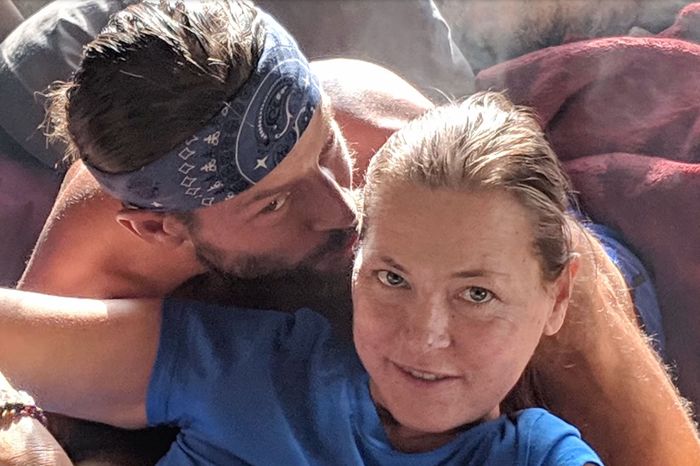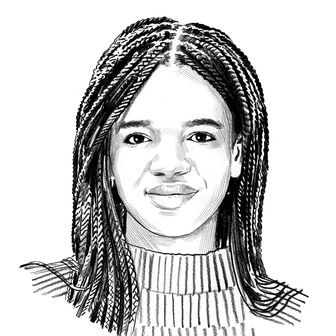
How does one go from McDonald’s manager to mummified corpse found in a sleeping bag wrapped in Christmas lights? First, get radicalized on mid-aughts-era blogs and start touting New Age spirituality beliefs and posting endlessly about them online. Eventually, you might find yourself in a Colorado commune playing “Mother God,” a 19-billion-year-old deity who birthed all creation and who was once reincarnated as Jesus Christ and Marilyn Monroe. That’s what happened to the late Amy Carlson after she went down the aforementioned rabbit hole, falling into a heady, and eventually Q-Anon-laced, wonderland called Love Has Won, a religious online community and cult based in Colorado. In their version of reality, Carlson was the 534th incarnation of the divine, fated to lead exactly 144,000 believers into a fifth-dimensional plane, freed from the bounds of our unsatisfactory 3-D world. She was also a YouTube livestreamer. It’s the era of parasocial, and often money-seeking, self-promotion after all. A three-part, Safdie Brothers–produced HBO docuseries, airing weekly beginning Monday, November 13, attempts to unravel the whole story.
Director Hannah Olson thinks a deadly combination of the hollow American dream, increasingly toxic internet micro-cultures, and a rise in conspiracy-obsessed, right-wing thinking is behind the irrationality she documented. Olson latched onto people who haven’t yet been “deprogrammed” to tell the docuseries’ complicated narrative in a way other cult docs aren’t able to do. “It was rare to see this kind of story told from the inside out,” Olson tells Vulture over Zoom. “What I used to construct the film is interviews with people who are still followers, still believe that Amy Carlson was God, and the 2,700 YouTube videos they left behind.” We get a first look at the footage Olson selected and testimonies from the group in the first trailer for the series, above.
Olson began the project three weeks after Carlson’s body was found in April 2021. “I grew up in Minnesota, and after 2016, I became really interested in the rise in conspiratorial thinking embodied by Donald Trump, people who follow him, and the people in this series,” she says. “The subjects fell through the cracks of our social system in a way that is really familiar to me growing up in the Midwest: no access to health care, no access to mental-health care. People looking to make sense of a reality that just doesn’t work for a lot of America anymore.” Olson emphasizes that white disgruntlement is by no means an excuse for the “dangerous and hateful conspiracy theories” espoused by Love Has Won, and she has no interest in platforming their often racist and antisemitic beliefs, but that doesn’t mean it’s not a contributing factor worth analysis.
“I was especially interested in the relationship between the beliefs that [Carlson] espoused and the cause of her death,” Olson explains. “I chose to focus on the ideology that underpinned Amy’s mission, which was that she could heal the world by taking on humanity’s pain.” People like the docuseries subject Sarah, who “had half a million dollars of medical debt and nowhere to go,” got mixed up in the group after internet research on cheap cures opened a can of worms. Olson calls the group’s syncretic faith a kind of “conspirituality,” or a blending of early internet New Age spiritual ideas peddled online with fabulous disinformation. Love Has Won might have even adopted Q-Anon and other conspiracies in vogue to cynically drive livestream traffic, recruit members, and make a buck off donations. Devotees were “looking for a reason for why their lives didn’t end up the way they thought they would,” Olson guesses. “The ideology that [Carlson] espoused took on a life of its own. Her followers so were intent on her being God that they neglected her humanity.” The alleged cult leader died due to complications from alcohol abuse, anorexia, and chronic colloidal silver ingestion, taken as a miracle “cure” to avoid COVID-19. HBO’s Love Has Won “ends up being about a race to get her medical attention” and the consequences of embracing fringe notions.
Carlson is “patient zero of the series” as someone “miserable in her own reality.” Not only an embodiment of “Mother God,” but a blueprint for how someone’s structure of reality can collapse very quickly if the algorithm catches on. “One of my favorite lines in the series is this guy named Andrew who was addicted to opioids,” Olson remembers. “And he says that being on the internet is a lot like dreaming because you lose control over it. It’s like a boat floating downstream and that stream takes you where it’s going to go.” The internet provides.


